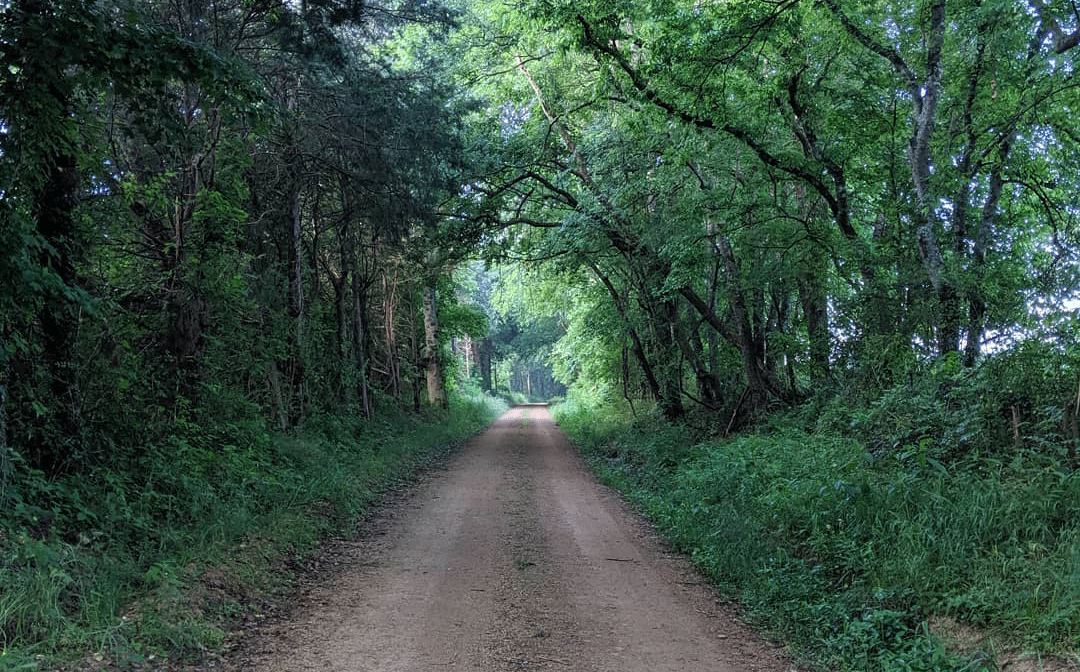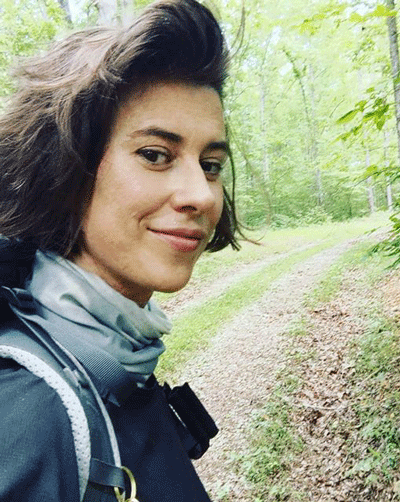
Sweat poured down Julia Lucas’s face as she walked beside an Alabama highway while shouldering a 35-pound backpack. A car drove past her, only to turn around and drive back toward the weary traveler.
Lucas didn’t know where to go or what to feel. She understood that fear was a necessary emotion for recreating this grueling walk of self-examination and personal growth.
This University of Iowa non-fiction creative writing MFA student found herself in the intense Alabama heat not by accident, but by choice. She was retracing the steps of her great-great-great grandmother, who abandoned her three young children in 1862 on foot from Hickman, Tenn., to Prairie Grove, Ark.
A man noticing Lucas’s sweaty appearance and exhausted expression stepped out from his truck wearing the biggest smile ever. He asked if she would like two bottles of water, and Lucas eagerly accepted his kind gesture.
“This trip was more like a dissolving of the self into something larger,” Lucas says. “I was humbled daily. The more time and work I put into this trip, the less I thought about myself.”
The Journey
Thanks to an MFA Summer Fellowship from the Graduate College, Lucas completed the same 400-mile trek that Sarah Redden made over three states during the Civil War era. Redden abruptly left her three young children at their home in Tennessee and never returned. She eventually settled in Arkansas, where she changed her name to Sarah Redenhower and would give birth to Lucas’ great-great grandmother.
“[Redden] did something similar to what I spent my career doing as a distance runner,” Lucas says. “And, because of course her genes make me up, I wanted to do something physical to intensify that bond. She contributed to making my body, I wanted to put my body through the footsteps that she had taken.”

Lucas, a retired professional runner and former collegiate all-American, utilized Google satellite maps and hand-drawn property maps from the 1860s to reconstruct Redden’s exact trail through the countryside ravaged by the war with temporary barracks for soldiers.
“Her story is just lost to time,” Lucas said. “In thinking about her and imagining her story, I do some work to bring her back. But it’s also wrong, just by nature of not having all the details.”
Each day of Lucas’s trip began around 4 or 5 a.m., with a walk to find water to make coffee. After her early-morning cup of joe, she began the day’s journey along only roads that existed during the Civil War and through forests of mostly old growth where nothing was built. The landscape eerily mimicked what the trail would have looked like over 150 years ago.
Lucas met several welcoming faces along the way, many of whom were generous and eager to hear her story. That said, as days dragged on and temperatures rose, Lucas would become exhausted and her pervading thought would be—do I have enough water to make it to the next stop?
Along with the heat and constant pressure to find food and water, Lucas’ iPad and camera were also stolen.
“The trip was really hard, and it would have been a lot harder for [Redden],” Lucas says. “She would’ve had to collect her own food along the way, and she didn’t have any of the techie gear that I wore. It would have been dangerous traveling at the time. There were so many deserted soldiers around.”
Throughout the trip, Lucas stayed engaged with the outside world by updating her social media followers (justrunjulia). She told her day-to-day story and encouraged them to explore their family’s history.
“I think a lot of people wonder where they come from and why they do the things they do and why life ended up this way when it could have ended up in another way,” she says. “It was exciting to see people on Instagram being excited about the adventure of exploring the past.”
After the journey
Having completed the life-changing journey in August, the road weary traveler believes that Redden became a very real person to her. “I feel like she’s the thing I carry with me, almost like a conscience,” Lucas says. “I know that’s primarily my creation.”
Lucas felt the trip was an essential and final step in piecing together her own picture of the psychologically tortured, athletically gifted women of her family. Her trip was one of time travel in many ways.
“I’m putting my hands where someone 200 years go put their hands, so it almost a feeling of stepping into their body,” Lucas says. “Because I have done this trip that an ancestor of mine did it feels like a way to collapse time between the two of us and I appreciate where I came from more. I understand the sacrifices made for me and the daring, dangerous, and improbable lives that these women led to give me a safe and happy place to grow up.”
Lucas credits the University of Iowa Nonfiction Writing Program for supporting her and her ambitious endeavor this summer.
“What’s special about Iowa City and the University of Iowa is you have permission to do your wildest project. The ceiling and walls are blown off in terms of what you could think about,” Lucas says. “Your wildest and most improbable and possibly most exciting and fruitful ideas have a place to grow.”
Because this journey was life-altering for Lucas, she intends to publish a book that will delve deeper into the myriad of adventures she experienced along the trail. Undoubtedly, this is only the first steppingstone for what will surely be an outstanding career for this creative writer.